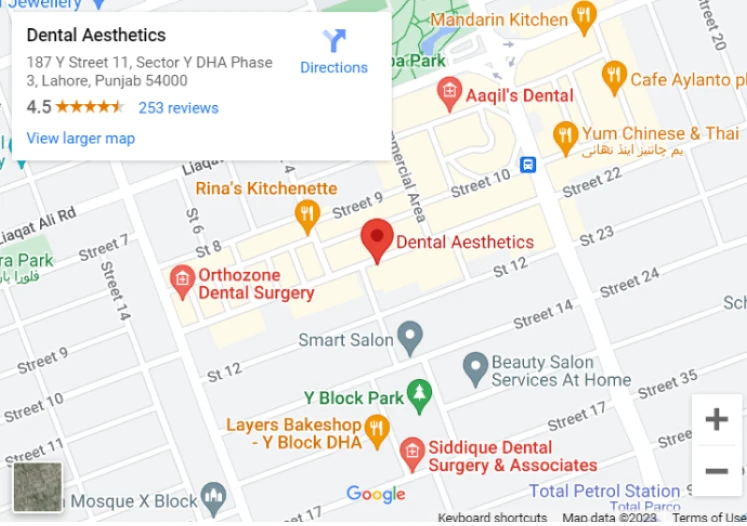The Alarming Truth: How Gum Disease Could Be Endangering Your Heart Health

August 1, 2025
When did you last consider the impact your gums could have on your heart? For most, oral care starts and stops with brushing, flossing, and the occasional dental visit, but recent studies show that periodontal bacteria (gum disease), similar to diabetes, often underemphasized and disregarded, have now been connected by scientists as a risk factor for heart attack, stroke, and other major cardiovascular diseases.
At Dental Aesthetics Lahore , our highly reputable periodontal assessments are created to catch gum disease early and address it in a manner that decreases systemic inflammation, decreases bacterial load, and helps maintain your heart function. If you've never considered the gum disease and heart health connection, now's the time to schedule your evaluation today and take an empowering step toward overall wellness.
Does Gum Disease Affect Heart Health?

Gum disease leads to tooth loss, but it could raise your risk for heart attack and stroke as well. Initially, gum disease starts as gingivitis (bleeding, red, inflamed gums), which can develop into periodontitis, where the infection kills the gum and bone that support your teeth. If left untreated, this becomes a systemic health threat.
This is where the gum disease and heart disease connection enters. If the gum infection is not resolved, oral bacteria enter the blood and cause chronic inflammation. This may result in:
- Plaque deposits within arteries
- Narrowing of blood vessels (atherosclerosis)
- Increased cardiac stress and blood pressure
Inflammation: The Overlooked Cause
Shockingly, the inflammation from gum disease doesn't remain in the oral cavity; it may travel through your bloodstream and affect major organs, particularly your heart. That's why professionals now include oral health as a primary indicator of cardiovascular health.
This inflammation:
- Destroys healthy gum tissue
- Makes arteries less pliable
- Increases the risk of blood clotting
Periodontal Bacteria: A Direct Threat to Your Arteries
The microorganisms that trigger gum disease (such as Porphyromonas gingivalis, Tannerella forsythia, and Treponema denticola) don’t exist solely in the oral cavity. Once in the blood system, they could take up residence in the lining of your arteries and cause inflammation. The presence of the bacteria creates fatty plaques, a defining feature of atherosclerosis. This results in smaller, inflamed arteries and increased vulnerability to cardiovascular events.
This is how periodontal bacteria and cardiovascular health correlate. It is important to note that, although indirect, gum disease exacerbates the risk factors that cause a heart attack.
Common Risk Factors for Heart Patients with Gum Disease
Certain lifestyle behaviours that hasten both gum and heart disease:
- Smoking
- Poor diet (high sugar, in particular)
- Diabetes
- Neglect of frequent dental care
Warning Signs to Pay Attention To
These are symptoms that your gums could be impacting more than your teeth:
- Bleeding on brushing or flossing
- Chronic halitosis
- Gum recession
- Poor chewing
- Loosening or moving teeth
- Enlarged or painful gums
Treatment Options and Pricing: Protect Your Smile and Your Heart

Today, modern dentistry customises gum disease treatment for health to minimise both oral bacteria and cardiovascular risk.
At Dental Aesthetics Lahore, we offer gum disease treatment to maintain stable heart health, such as:
| Treatment | Procedure |
|---|---|
| Scaling and Root Planing | Deep cleaning below the gum line to eliminate tartar and bacteria, shrink gums back onto teeth and lower bacterial load. |
| LANAP Laser Treatment | Minimally invasive laser treatment to destroy bacteria without damaging healthy tissue. Suited for diabetic and |
| cardiac-risk patients because of quick healing and minimum bleeding. | |
| Flap Surgery | For serious cases with deep pockets or bone loss, they permit complete cleansing and possible bone grafting. |
Don't let the symptoms worsen. Schedule your gum disease assessment today and receive professional advice based on your heart health.
How Gum Disease Treatment Helps Heart Health
Studies demonstrate that gum disease treatment for heart health can:
- Decrease systemic inflammation (CRP, IL-6)
- Enhance endothelial (artery wall) function.
- Increase the need for cardiac medications.
Our Strategy at Dental Aesthetics Lahore
We treat your entire body when we treat oral infections. Here's how we stand out:
- Board-certified periodontists with cardiac-safe training in dental procedures
- State-of-the-art technology, including LANAP laser
- Flexible payment structures for greater treatment
- Lifestyle counseling for diet, smoking, and everyday oral care
Prevention: What You Can Do Starting Today
Since heart disease and poor dental hygiene are heavily interlinked, ensure proper maintenance of your oral health with these easy habits:
- Brush twice a day with fluoride toothpaste.
- Floss or interdental brush once a day
- Use an antibacterial mouthwash
- Quit smoking
- Cut down on sugar
- Have professional cleanings every 3–4 months.
Conclusion
The link between gum disease and heart health is no longer theoretical—it's a medical fact. From oral bacteria and cardiovascular risk to the effect of inflammation on artery damage, science speaks with one voice: ignoring your gums puts your heart in danger. Whether you're looking for gum disease treatments, already have cardiovascular disease, or are just concerned about your overall health, we are here to assist. Take preventative action today and book your heart-periodontal checkup at Dental Aesthetics Lahore.



